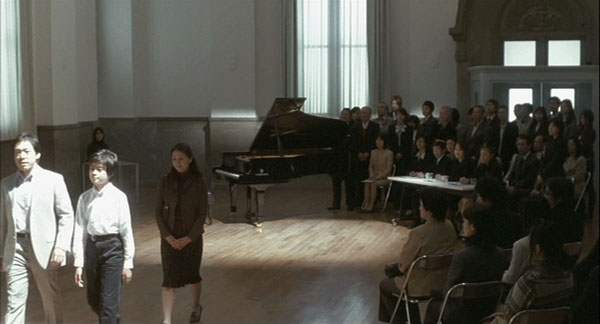Shot by the cinematographer of Loft and Retribution. Classy, austere-looking locked-down long shots hiding behind shelves and banisters made me think this is Kurosawa’s prestige pic, hence the jury prize at Cannes and the great reviews. Closest in tone to his Bright Future, which is also the last movie of Kurosawa’s which played here theatrically, but with no sign of the crazy left turns, the never-answered questions that make his other films so maddeningly mysterious. One thing that makes this easily fit in with the rest of his movies, though, is the theme of people not connecting or communicating, not really knowing each other or themselves, as Japan crumbles around them. Kurosawa doesn’t seem like a very happy guy – but this film has a happy ending, probably his most hopeful one ever.
I recognized star Teruyuki Kagawa but couldn’t think which of K.K.’s movies he’d been in – turns out he’s the main dude in the earthquake/agoraphobia section of Tokyo! and the sheriff in Sukiyaki Western Django. Sasaki-san is a middle manager type, and when the company is reorganizing with layoffs, his boss asks him what skills he has, so he can be used elsewhere in the company. He gets up and starts packing. Much of the movie manages this balance between deadpan humor and realistic tragi-drama.

Back home to older son Takashi (Yû Koyanagi of Crows Zero), an absentee teen fuckup who decides to join the U.S. military, younger son Kenji who only wants to take piano lessons, and wife/mother Megumi who quietly tolerates all of this (and suspects her husband’s job problems) without getting any breaks or chances to express herself. Dad forbids Kenji from learning piano and gets increasingly obstinate about it, fearing a breakdown of his parental authority, so the boy takes lessons in secret. Sasaki waits in line regularly at the employment agency, hangs out at the mall, and eats lunch from a homeless/unemployed trailer every day with his laid-off buddy who has become an expert at living off his severance pay and lying to his wife.

As time passes, the movie gets harsher. Megumi has nightmares of her oldest son returning home shellshocked (the only dream/fantasy scene in the film), Sasaki takes a demeaning job as a janitor and when he finds out about Kenji’s piano lessons he knocks the kid down the stairs sending him to the hospital. One day K.K.’s favorite actor Kôji Yakusho (star of Charisma, Cure, Doppelganger, Retribution), a depressed ex-locksmith who decides crime is the answer to his life problems, breaks into their home and kidnaps Megumi. He’s a crappy kidnapper, but he offers her a temporary escape – she meets her husband and learns about the janitor job, then spends the rest of the day enjoying her freedom from family with the kidnapper.

In the morning it looks like he’s drowned himself. Returning home are the wife (who slept in a shack on the beach), her husband (who slept in the gutter, knocked down by a car while running from the mall) and Kenji (who slept in jail). Flash-forward, dad seems content at his job, mom is getting letters from Takashi, and Kenji rocks his piano recital. And thank god, because I was going to be angry at the movie if it had ended ten minutes earlier.

Good ones from Cinema Scope: “The outline of Kurosawa’s design is as powerful as some of the particulars within are slightly uncertain.” and on the ending as the parents proudly walk Kenji away from the piano, “Years from now, when someone goes looking for the cinematic moment that most fully embodied this troubled stretch of history, they will undoubtedly settle on this forcefully ambiguous gesture.”
Greencine: “Kurosawa’s framing is always a bit cluttered and claustrophobic, and his willingness to sit and watch for a little too long makes it seem like violent disaster is always just on the verge of breaking out. And then suddenly it does and all hell breaks out.”
Tom Mes, who should know:
Anyone familiar with Kurosawa’s body of work will know that it is often the very real ills of society and its people that give his films their power and their chill: the balding middle-aged man muttering to himself while waiting for his dry-cleaning in Cure, the lack of eye contact in dialogue scenes in Pulse, or the way a husband and wife brush reason aside in Séance. … Tokyo Sonata contains many examples of simple, mundane incidents – family dinners, job interviews, scenes from a mall and walks in the park – but they are charged with a power to distress that is unparalleled even in Kurosawa’s oeuvre. … The world has finally caught up with the films of Kiyoshi Kurosawa, and it’s a horrifying, frightening sight to behold. Tokyo Sonata would be unbearable if it weren’t the director’s masterpiece.
Kurosawa:
This film will portray a very ordinary family in modern Japan. I start from a point where lies, suspicion and a complete breakdown of communication have already established themselves within the family. Without a doubt, this is ‘modern’ and this is also ‘Japan.’ However, I would like to show a glimmer of hope in the end. Can I do that? Even if I could do so, would that be something that can save a conventional family? I just do not know. Since I do not know, I have a strong desire to make this film.